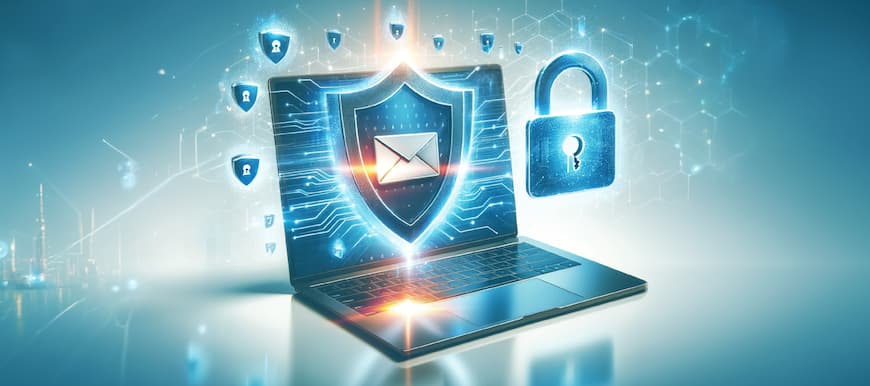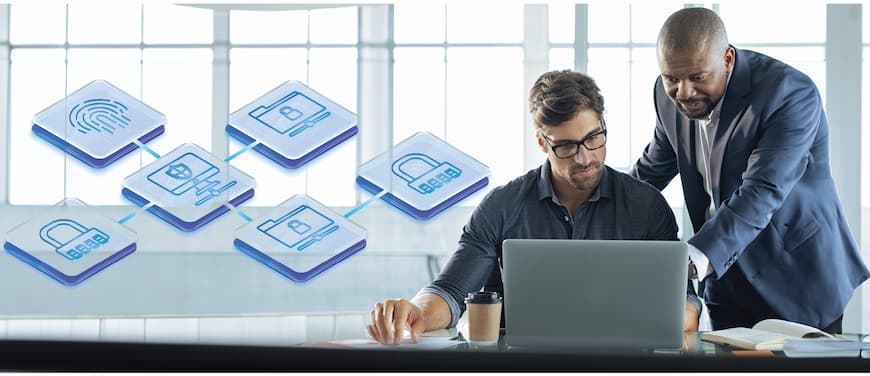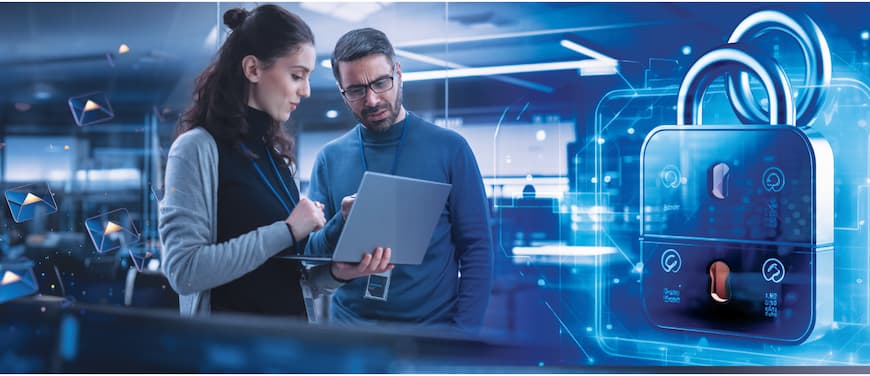File sharing has become an integral part of both personal and professional life. Whether you're collaborating on a project with colleagues or sharing sensitive documents with third parties, the need for secure file sharing is paramount.
With cyber threats on the rise, it's crucial to stay informed about the latest methods and tools to ensure the safety and privacy of your shared files.
This guide will provide you with the knowledge and tools you need to protect your digital assets.
Secure File Sharing Methods
There are various methods for sharing files securely, each with its strengths and weaknesses. Here are the most common methods:
Encrypted Email
Email encryption is a method of securing the content of email messages to protect them from unauthorized access. It uses various encryption techniques to ensure that only the intended recipient can read the email.

It's important to note that the effectiveness of encrypted email depends on proper implementation, key management, and the security of the underlying infrastructure. Users must be vigilant about safeguarding their private keys and ensuring that their email clients or tools are configured correctly to use encryption.
Some popular encrypted email services include:
- ProtonMail: ProtonMail is known for its end-to-end encryption and user-friendly interface. It offers both free and paid plans and has built-in security features.
- Tutanota: Tutanota offers end-to-end encryption for both emails and contacts. It provides open-source apps and is known for its privacy-focused approach.
- Hushmail: Hushmail offers encrypted email services and is user-friendly. It provides both free and paid plans with various features.
- Posteo: Posteo is a privacy-focused email service based in Germany. It offers end-to-end encryption and features like calendar and address book.
- Mailfence: Mailfence is a secure and private email service that offers end-to-end encryption and digital signatures. It provides a variety of features, including calendar and document storage.
- CounterMail: CounterMail offers strong encryption and anonymity features. It uses OpenPGP and provides a secure webmail interface.
- StartMail: StartMail is known for its privacy features and user-friendly interface. It offers encryption, anonymous email aliases, and other security measures.
Secure File Transfer Protocols

There are several secure file transfer protocols and methods available for transferring files over a network while maintaining data confidentiality and integrity. Some of the most widely used secure file transfer protocols include:
- Secure Shell (SSH): SSH is a widely used protocol for secure remote access and file transfer. It provides encryption and authentication mechanisms to protect the confidentiality and integrity of data during transmission. Tools like SCP (Secure Copy Protocol) and SFTP (SSH File Transfer Protocol) are commonly used for secure file transfers over SSH.
- FTP Secure (FTPS): FTPS is an extension of the File Transfer Protocol (FTP) that adds support for SSL/TLS encryption. It can use either explicit or implicit encryption, making it suitable for secure file transfers.
- HTTPS: Hypertext Transfer Protocol Secure (HTTPS) is primarily used for secure web communications but can also be used for secure file transfers. HTTPS utilizes SSL/TLS for encryption, and can be used for file uploads and downloads via web-based interfaces.
- AS2 (Applicability Statement 2): AS2 is a widely used protocol for B2B (business-to-business) file transfers. It's based on HTTP and uses digital signatures and encryption to ensure the security and authenticity of transmitted data.
- Managed File Transfer (MFT): MFT solutions are enterprise-level tools that offer secure and automated file transfers. They often support multiple protocols and provide features like encryption, audit trails, and workflow automation.
- SCP (Secure Copy Protocol): SCP is a part of the SSH suite and is a simple way to transfer files securely. It uses the SSH protocol for encryption and authentication.
- SFTP (SSH File Transfer Protocol): SFTP is also part of the SSH suite and offers secure file transfers over an encrypted connection. It's similar in functionality to FTP but with added security.
- WebDAV (Web-based Distributed Authoring and Versioning): WebDAV is an extension of the HTTP protocol that allows for secure collaborative editing and file management over the web. It can be used securely when implemented with SSL/TLS.
- AS3 (Applicability Statement 3): AS3 is another B2B file transfer protocol that combines FTP with digital signatures and encryption for secure transmissions.
- PeSIT: PeSIT is a secure file transfer protocol often used in Europe. It's designed for reliability and security and can be used in various industries.
- Odette File Transfer Protocol (OFTP): OFTP is a secure file transfer protocol mainly used in the automotive industry. It incorporates encryption and digital signatures to ensure secure data exchange.
When choosing a secure file transfer protocol, consider your specific security requirements, the compatibility of the protocol with your systems, and any regulatory or compliance standards that may apply to your organization's data transfers. Additionally, always ensure that you configure and use these protocols properly to maximize security.
Cloud Storage Services

Cloud storage services are online platforms or services that allow individuals and organizations to store and manage their digital data, such as documents, photos, videos, and other files, on remote servers. These remote servers are typically hosted and maintained by third-party companies, often referred to as cloud service providers.
Some well-known cloud storage providers include:
- Google Drive
- Dropbox
- Microsoft OneDrive
- Apple iCloud
- Amazon Web Services (AWS) S3
- Box
- pCloud
- Mega
- Sync.com
Users should choose a cloud storage service based on their specific needs, such as storage capacity, collaboration features, and pricing. It's essential to review the terms of service, privacy policies, and security features of a cloud storage provider to ensure that it meets your data protection and access requirements.
Encrypted Messaging Apps
Encrypted messaging apps are applications that use encryption technology to protect the privacy and security of the messages sent and received by their users. This encryption ensures that only the intended recipients can access and read the messages, preventing unauthorized access from hackers, government agencies, or other third parties.
Some popular encrypted messaging apps include:

- Signal: Signal is known for its strong commitment to privacy and open-source code. It offers end-to-end encryption for text messages, voice calls, and video calls.
- WhatsApp: WhatsApp uses the Signal Protocol for end-to-end encryption, protecting text messages, voice calls, and video chats. It's one of the most popular encrypted messaging apps worldwide.
- Telegram: Telegram offers both regular and secret chats, with secret chats providing end-to-end encryption. It also allows for self-destructing messages and file sharing.
It's important to note that while encrypted messaging apps offer a high degree of privacy and security, no system is completely invulnerable. Users should still exercise caution and good security practices, such as keeping their devices and apps up to date and protecting access to their encryption keys and credentials.
Encrypted USB Drives
Encrypted USB drives, often referred to as encrypted USB flash drives or secure USB drives, are portable storage devices that incorporate encryption technology to protect the data stored on them. These drives use encryption to scramble the data in such a way that only authorized users with the proper encryption key or password can access the information.
These encrypted USB drives are commonly used by individuals and organizations that need to protect sensitive data while on the go. They are especially valuable for professionals who travel frequently or handle confidential information, as well as in industries with stringent data security requirements like healthcare, finance, and government.
Virtual Data Rooms

A Virtual Data Room (VDR) is a secure online repository for storing and sharing sensitive documents and data. VDRs are typically used for activities that require a high level of confidentiality, such as mergers and acquisitions, due diligence, legal transactions, financial audits, and other situations where the protection of sensitive information is critical. Some key features and benefits of virtual data rooms include:
Security: VDRs are designed with a strong focus on security. They use advanced encryption, access controls, and authentication measures to protect the confidentiality of data. This makes them much more secure than traditional file-sharing methods like email or physical document sharing.
Access Control: VDRs allow administrators to set granular access permissions. This means you can specify who can view, edit, download, or print specific documents. Access can be revoked or modified at any time, offering a high degree of control.
Audit Trails: VDRs maintain detailed logs of all user activity within the system. This includes who accessed which documents, when they accessed them, and what actions they performed. These audit trails are essential for compliance and accountability.
Document Expiry: Some VDRs allow you to set expiration dates for documents. After a certain period, documents are automatically removed from the VDR, reducing the risk of information remaining accessible beyond its intended use.
Dynamic Watermarking: Virtual data rooms often support features like dynamic watermarking to deter unauthorized sharing of printed documents. Watermarks are clearly visible, applied diagonally across the page or screen, yet do not interfere with the readability of the underlying text. The watermark text is customizable, and you can embed the following dynamic information:
- User's Name
- User's email address
- User's IP address (only with ShareVault Pro and ShareVault Enterprise)
- Current date
- Current time
Q&A and Collaboration: VDRs provide tools for users to ask questions and collaborate on documents securely. This is particularly useful in situations like due diligence, where multiple parties need to communicate and share information.
User-Friendly Interface: Most VDRs are designed with a user-friendly interface, making it easy for all parties involved to access and navigate documents. This can reduce the learning curve and improve overall efficiency.
24/7 Access: VDRs are accessible 24/7 from anywhere with an internet connection. This flexibility is crucial for global transactions and remote work.
Compliance: VDRs often adhere to industry-specific regulations and compliance standards, such as HIPAA for healthcare or GDPR for data protection in Europe.
Cost Savings: While virtual data rooms come with a cost, they can actually save money compared to traditional methods that involve physical documents, travel expenses, and extensive manual processes.
Data Backup and Redundancy: VDR providers usually have robust data backup and redundancy measures to ensure that data is not lost due to technical failures.
Customer Support: Many VDR providers offer customer support to assist with setup, training, and any issues that may arise during the use of the platform.

There are several VDR providers in the market, each with its own set of features and pricing models. Some popular providers include:
Merrill DataSite: Merrill offers secure data rooms for M&A, IPOs, and other financial transactions. They have a strong reputation for data security.
Intralinks: Intralinks is known for its data room services, particularly for financial and legal transactions. They offer collaboration tools and extensive reporting.
Firmex: Firmex provides a user-friendly VDR platform with features for document sharing, access control, and audit trails. It's widely used in various industries.
SecureDocs: SecureDocs is a user-friendly and cost-effective VDR solution suitable for smaller businesses and startups. It's commonly used for M&A and fundraising.
Box Virtual Data Room: Box is primarily known as a cloud storage and file sharing service, but they also offer a VDR solution. They focus on secure document sharing and collaboration.
Drooms: Drooms is a European-based VDR provider with a strong presence in the German market. They offer data rooms for M&A, real estate, and other applications.
DataRoomZ: DataRoomZ is known for its secure data rooms designed for legal, financial, and corporate transactions. They provide tools for due diligence and compliance.
Onehub: Onehub offers a versatile platform for secure document sharing, collaboration, and custom branding. While not exclusive to VDR, it's used for such purposes.
Citrix ShareFile: Citrix ShareFile provides secure file sharing and storage services. It's often used in industries that require secure document management, including legal and healthcare.
Ansarada: Ansarada specializes in data rooms for M&A, due diligence, and other corporate transactions.
ShareVault: ShareVault is a highly reputable virtual data room (VDR) provider known for its services in secure document sharing and collaboration, primarily used in industries that require secure data management, such as pharmaceuticals, biotech, and life sciences, among others.
ShareVault is particularly popular for its robust features, user-friendly interface, modern look and feel and flexible pricing.
When selecting a VDR, it's important to consider factors like the sensitivity of your data, the number of users, your budget, and any specific compliance requirements. It's also a good idea to request demos or trials to see which platform best meets your needs.
Best Practices for Secure File Sharing
In addition to using secure methods and tools, it's essential to follow best practices for secure file sharing:
Choose Reputable Secure File Sharing Services
Use reputable file sharing services that have robust security features and a strong track record of protecting user data. Consider using platforms that have extensive experience in your industry.
Use Encryption
Ensure that the platform you're using employs robust encryption methods, encrypting files both at rest and in transit. This ensures that even if someone gains access to the files, they won't be able to read or use the data without the encryption keys.
Practice Least Privilege Access
Least privilege access is the practice of granting individuals only the minimum level of access or permissions necessary to perform their tasks or functions. In other words, users and entities should have access to the smallest set of resources and privileges required to accomplish their specific duties and nothing more.
Employ Multi-Factor Authentication
Ensure the platform you choose employs multi-factor authentication (MFA) for accessing files and sharing. This adds an extra layer of security, making it harder for unauthorized users to gain access.
Keep Software and Systems Updated
One of the benefits of cloud-based file sharing platforms is that software updates are automatic. However, if there is security software that resides on your servers, ensure that it is regularly updated or patched.
Audit and Monitor
Set up logging and monitoring to track file access and changes. Regularly review logs to detect unusual or suspicious activities.
Train Employees
Educate employees on best practices for secure file sharing, including how to recognize phishing attempts and the importance of strong password practices.
Set Expiration Dates and Revocation
Implement expiration dates for shared files and provide an option to revoke access when it's no longer needed. This reduces the risk of unauthorized access in the future.
Secure Mobile Access
If your employees use mobile devices for file sharing, ensure that those devices are secured with strong authentication, encryption, and remote wipe capabilities in case of loss or theft.
Regular Backups
Maintain regular backups of shared files so that you can recover data in case of accidental deletion, data corruption, or a security incident.
Legal and Compliance Considerations
Ensure that the platform you employ and your file sharing practices comply with relevant laws and regulations, such as GDPR, HIPAA, or industry-specific requirements.
Share Links, Not Files
When possible, share links to files instead of emailing attachments. This allows you to control access more effectively and reduce the risk of data leakage.
Regularly Review and Update Policies
Periodically review and update your file sharing policies and practices to adapt to evolving security threats and technology changes.
Secure file sharing is a fundamental aspect of the modern digital landscape, and it's crucial to stay informed about the best methods and tools for protecting your data. As we move further into 2025, the importance of secure file sharing cannot be overstated.
By understanding the significance, utilizing the right methods, and implementing the best tools and practices, you can ensure that your files remain private and intact, regardless of the digital threats that may arise.
ShareVault is used in a variety of business transaction scenarios to provide a secure virtual data room for the sharing of business documents during the due diligence associated with M&A (buy-side or sell-side), bio-pharmaceutical partnering, Technology Licensing, Syndicated Loans, Fundraising, Bankruptcy, and Investor Communications.
Backed by the experience of $50+ billion in successful deals, ShareVault acts not only as your technology provider but also as a business partner who understands dealmaking and due diligence.
